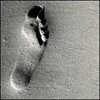Francesca Woodman
C. Townsend
"Prodigies in photography are singularly rare; women prodigies virtually unheard of." - Abigail Solomon-Godeau. Francesca Woodman (1958-1981) has become one of the most talked about, most studied, and most influential of late twentieth century photographers. She started taking photographs when she was barely thirteen and in less than a decade created a body of work that has now secured her a reputation as one of the most original American artists of the 1970s. Woodman brought an understanding of Baroque painting, Modernist art and contemporary post-minimalist practice to her haunting, sensual images. Both in her work with models, and in sometimes disturbing self-portraits, Woodman made a thoroughgoing challenge to the certainties of photography. Interested in how people relate to space, and how the three-dimensional world can be reconciled with the two dimensions of the photographic image, Woodman played complex games of hide-and-seek with her camera. One of the enduring appeals of her work is the way in which she constructs enigmas that trap our gaze. She depicts herself seemingly fading into a flat plane, merging with the wall under the wallpaper, dissolving into the floor, or flattening herself behind glass. But is this disappearing act really the artist putting in an appearance? That we are never completely sure what we are looking at means that we keep looking. Woodman constantly compares the fragility of her own body with the physical environment around her. Fascinated by transformation and the permeability of seemingly fixed boundaries, Woodman's work conjures the precarious moment between adolescence and adulthood, between presence and absence. This comprehensive monograph includes over 250 of Woodman's works - some of which have never been exhibited or published before - as well as extracts from her journals selected by her father George Woodman. There are examples of her large-scale blueprints and reproductions of her photobooks, including "Some Disordered Interior Geometries", which was published in 1981, the year she took her own life. An extensive text by Chris Townsend examines the influences of gothic literature, surrealism, feminism and post-minimalist art on Woodman's photographs. Townsend places Woodman in relation to her contemporaries, such as Cindy Sherman and Richard Prince. This book confirms Woodman's position as one of America's most talented photographers and important artists since 1970, with an influence lasting well beyond her own time. Interested in how people relate to space, and how the three-dimensional world can be reconciled with the two dimensions of the photographic image, Woodman played complex games of hide-and-seek with her camera. One of the enduring appeals of her work is the way in which she constructs enigmas that trap our gaze. She depicts herself seemingly fading into a flat plane, merging with the wall under the wallpaper, dissolving into the floor, or flattening herself behind glass. But is this disappearing act really the artist putting in an appearance? That we are never completely sure what we are looking at means that we keep looking. Woodman constantly compares the fragility of her own body with the physical environment around her. Fascinated by transformation and the permeability of seemingly fixed boundaries, Woodman's work conjures the precarious moment between adolescence and adulthood, between presence and absence.
więcej
Informacje dodatkowe o Francesca Woodman:
Wydawnictwo: angielskie
Data wydania: b.d
Kategoria: Albumy
ISBN:
Liczba stron: 0
Kup książkę Francesca Woodman
Sprawdzam ceny dla ciebie ...
Cytaty z książki
REKLAMA

















Chcę przeczytać,